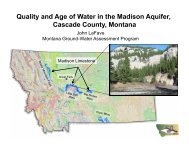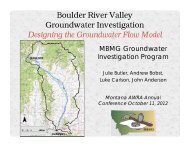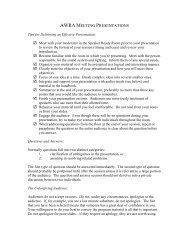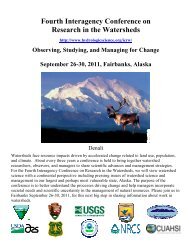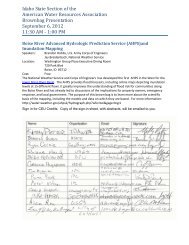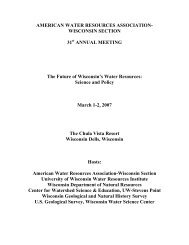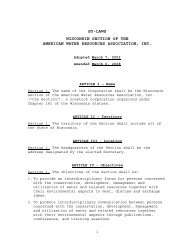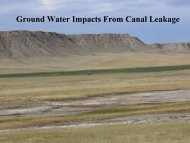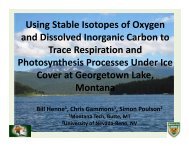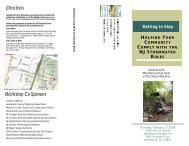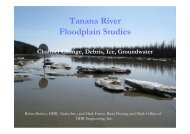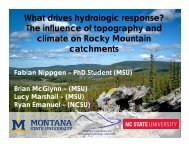Wisconsin's Role in Great Lakes Restoration - American Water ...
Wisconsin's Role in Great Lakes Restoration - American Water ...
Wisconsin's Role in Great Lakes Restoration - American Water ...
You also want an ePaper? Increase the reach of your titles
YUMPU automatically turns print PDFs into web optimized ePapers that Google loves.
SESSION 3B:<br />
Climate Change and <strong>Wiscons<strong>in</strong>'s</strong> <strong>Water</strong> Resources<br />
Friday, March 4, 2011<br />
8:20 – 10:00 a.m.<br />
Climate Change and Wiscons<strong>in</strong>’s <strong>Water</strong> Resources: Results of WICCI’s First Adaptation<br />
Strategy Report<br />
Tim Asplund, Wiscons<strong>in</strong> Department of Natural Resources, Madison, WI,<br />
tim.asplund@wiscons<strong>in</strong>.gov<br />
Carolyn Rumery Betz, University of Wiscons<strong>in</strong>-Madison, Madison, WI, betzc@aqua.wisc.edu<br />
James Hurley, University of Wiscons<strong>in</strong>-Madison, Madison, WI, hurley@aqua.wisc.edu<br />
The Wiscons<strong>in</strong> Initiative Climate Change Impacts (WICCI) released its first climate change<br />
adaptation strategy report <strong>in</strong> February 2011, Wiscons<strong>in</strong>’s Chang<strong>in</strong>g Climate: Impacts and<br />
Adaptation. The report is a product of a statewide collaborative effort between the University<br />
of Wiscons<strong>in</strong>, the Department of Natural Resources, and other agencies and <strong>in</strong>stitutions.<br />
Climate scientists analyzed historic temperature and precipitation data to document how the<br />
state’s climate has changed. <strong>Water</strong> resource experts also looked at long term ice cover, lake<br />
level, groundwater and stream baseflow data. The conclusions are that changes <strong>in</strong><br />
Wiscons<strong>in</strong>’s climate are reflected <strong>in</strong> changes to our water resources, but the direction and<br />
magnitude of those changes are <strong>in</strong>timately l<strong>in</strong>ked to local and regional hydrologic conditions.<br />
Future projections of temperature and precipitation allowed the <strong>Water</strong> Resources Work<strong>in</strong>g<br />
Group to identify six probable impacts of climate change on our water resources that should<br />
be addressed <strong>in</strong> an adaptation framework: <strong>in</strong>creased flood<strong>in</strong>g; <strong>in</strong>creased harmful blue-green<br />
algal blooms; <strong>in</strong>creased demand for groundwater extraction and demand for water; changes<br />
<strong>in</strong> seepage lake levels; <strong>in</strong>creased sediment and nutrient load<strong>in</strong>g; and <strong>in</strong>creased spread of<br />
aquatic <strong>in</strong>vasive species.<br />
At last year’s AWRA meet<strong>in</strong>g, the WICCI <strong>Water</strong> Resources Work<strong>in</strong>g Group sponsored a<br />
special workshop to beg<strong>in</strong> develop<strong>in</strong>g adaptation strategies to address these impacts. We<br />
also identified who could implement the strategies, discussed the scale and tim<strong>in</strong>g of the<br />
strategies, and articulated potential obstacles. This year we will share these adaptation<br />
strategies and discuss next steps for implementation. We have already funded new research<br />
projects, developed educational materials for schools, and shared <strong>in</strong>formation with<br />
professional organizations. We plan on work<strong>in</strong>g with lake and watershed groups, local public<br />
health groups and regional and municipal government officials as part of our outreach efforts.<br />
55



